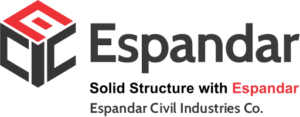







Espandar Civil Industries Company
Cement holdings are playing the main role in cement markets nowadays and Espandar Civil Industries Co.(ECIC) consisting of three cement companies ( Arta Ardebil , Faraz Firouzkuh and Neyzar Qom ) ,two lime factories (Azarshahr and Alborz) ,one shipping company called Espandar Amn Tarabar Transportation, One information technology company called Espandar Total Solution Company (ETSC) , Mortar production factory called Espandar Building Solution Company (EBSC) and the only private cement holding in Iran, already has 5% of Iran`s total cement production.
Espandar holding is also a successful joint venture between Iranian and foreign investors and this joint venture lead the group to produce high-quality products recognized in the market under its very own Espandar brand.
Espandar Management`s focus has always been on the long-term human resource programs and recognition of skills as much as investment on technology and production. Also safety and occupational health for life protection and integrity of our workers has been a pillar corporate policy of Espandar.
Saving energy, taking care of the environment and keeping our nature clean and tidy has always been on the top of Espandar priorities.
The sincere thanks of Espandar to our workers due to their continuous loyalty, enthusiasm and extraordinary performance, to the communities which are hosts to our cement plants in order to support our industrial activities and finally to our customers whom their loyalty to Espandar brand can never be valued very highly.

Espandar Products and Services
The result of the chemical reaction of limestone, clay and other additives under intense heat treatment in a furnace, which usually contains calcium silicate and aluminate. To produce gray clinker, raw materials such as iron oxide, clay, etc. are combined with limestone.
The result of grinding and mixing clinker and other additives (gypsum, slag, etc.) in a cement mill. Portland cement is the most common type of cement.
If the type of cement is not specified, type one cement is considered. This type of cement is used in situations with a low risk of sulfate attack and is used in the manufacture of ordinary concrete.
1-325: 28-day resistance of this cement is 325 kg / cm2
1-425: The 28-day resistance of this cement is 425 kg / cm2
This type of cement has the largest share of production in the country. This type of cement has low hydration heat and must be resistant to moderate sulfate attacks. Type 2 cement is used in groundwater systems with a high percentage of sulfate.
Anti-sulfate cement that is produced for use in concretes that have a high resistance to sulfates. This type of cement is used to build dams, bridges and underground structures due to its low hydration heat and very high resistance. The use of this cement is not recommended due to chlorinated chemical attacks in reinforced concrete.
This type has 15% pozzolan. Pozzolani cement is used in large structures and its advantage is its low heat hydration type. Although its short-term resistance is lower than other types, its resistance increases in the long run. The most important characteristic of this type is its high resistance to chemical attacks against chlorine and sulfate. Concrete made from this cement has low permeability, high durability and good resistance to chemical attacks.
This product contains 15 to 30% pozzolan. The grade of pozzolan in this cement can be changed according to the customer's wishes. This type of cement is used in the construction of dams.
This cement is similar to Portland Cement 1-325 in physical properties and chemically similar to pozzolanic Portland cement and has similar uses for this type of cement.
Portland cement has a high softness that causes more water absorption and creates more suitable conditions to increase the strength of cement mortar so that the growth of resistance of this type of cement begins with a suitable slope and continues after 28 days and over time to the highest possible level. It arrives. Due to the high softness of cement and filling the pores between the sand, which as a result provides the required filler and reduces the deep cracks and micro-cracks in the cement surfaces and prevents water penetration.
Also, this type of cement has a good setting time, which creates a suitable time opportunity for optimal use of cement mortar. Increasing the wear resistance of cement surfaces due to the presence of higher silica in this cement has a direct effect on reducing physical erosion and increasing the life of cement parts. It should be noted that due to the low heat resulting from the reaction of water with this cement, the resulting heat is gradually removed at the same time as the cement mortar hardens and prevents cracking of the surfaces of the cement piece. The use of this cement eliminates the undesirable phenomenon of dandruff in the cement part and prevents the carbonation of concrete, as well as reduces the phenomenon of water descaling and shrinkage of concrete.
In this type of cement, if the percentage of additives is in the range of 20%, it is called composite Portland cement, and if the percentage of additive composition is in the range above 20%, it is called special composite Portland cement.
With 92% purity, this product is the highest quality type of lime produced, which is widely used in the market. Its most important customers are oil refineries, power plants, the Water and Sewerage Organization, and the copper and steel industries. This product is the main product of Espandar.
Special product for pewter. Hydrated Espandar lime, which is produced only in Azarshahr lime, has 96% purity. The customers of this product are petrochemical and chlorine industries.
High purity lime is most used in poultry and fish farming industries.
Clump lime is most used in the steel industry. The grain size of this product is between 40 to 100 mm.
Providing a variety of road freight services within the country
